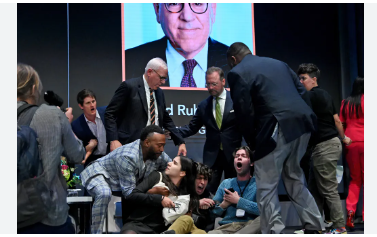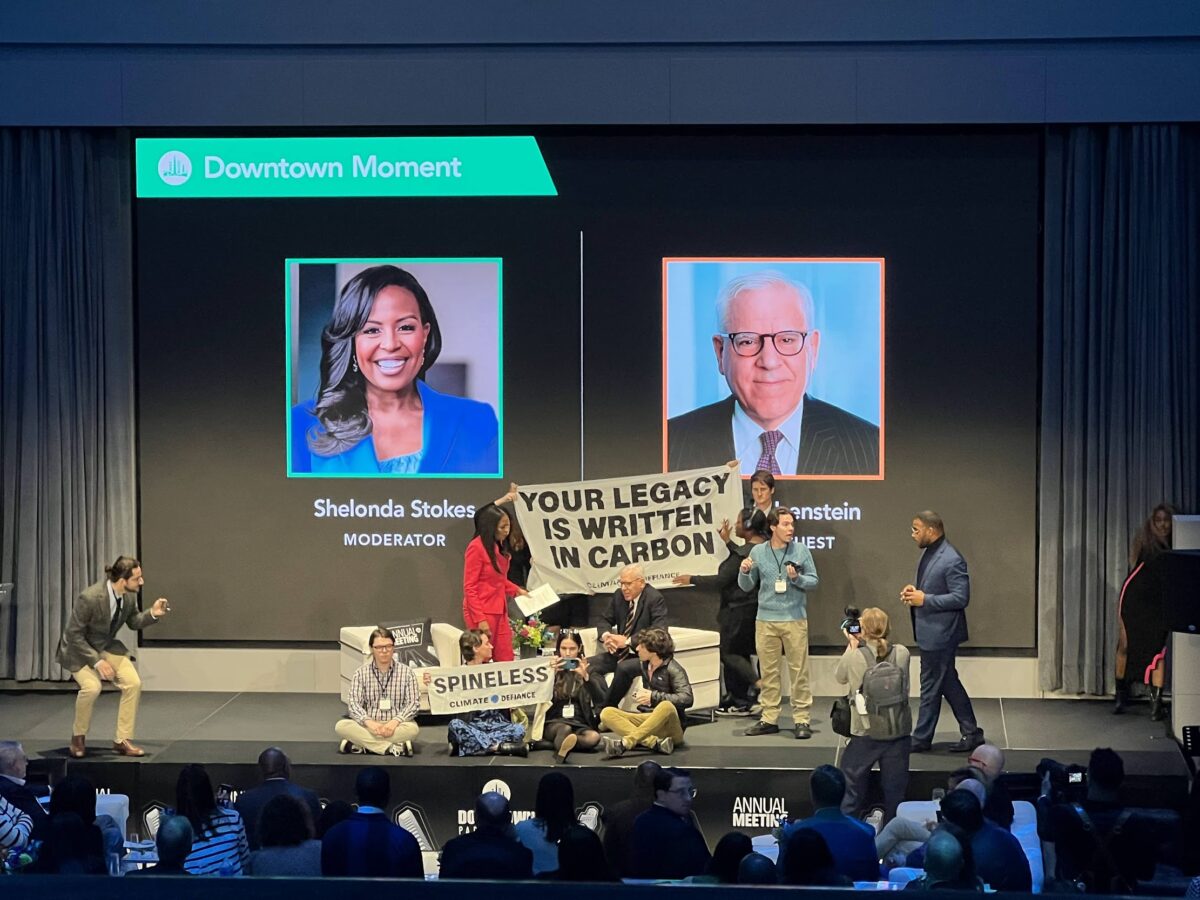
An interruption of a fireside chat with the Orioles’ new owner punctuated an event otherwise dominated by positivity about the neighborhood’s prospects.
When Michael Benevento first came to Baltimore to study at the Maryland Institute College of Art (MICA), he could never imagine how downtown Baltimore would play into his life story.
More than 20 years later, with his life partner and fellow director Julianne Hamilton by his side, the co-leader of Bromo Arts District tentpole Current Space cemented the arts venue’s place in the neighborhood’s history by accepting the Cultural Influence Award winner at the Downtown Partnership of Baltimore’s (DPOB) latest annual meeting.
The quip of the evening, coined by DPOB President Shelonda Stokes, was “downtown’s moment.” This expanded on Gov. Wes Moore’s frequent declaration that “this is Maryland’s decade and Baltimore’s time.”
Benevento, a photographer and sculptor who found community within Current Space during the mid-2000s, knows how long it takes for such moments to come along. He, like speakers Gov. Moore, Mayor Brandon Scott and Stokes, credited partnerships and collaboration as key to downtown’s success.
But, as climate protesters’ interruption of a fireside chat with the Baltimore Orioles’ new owner showed, the event’s optimism about downtown’s future came with a caveat.

Charm City glitterati
In a few ways, DPOB’s annual meeting captured the excitement, and tension, of economic development in the city’s traditional commercial district. The organization, which focuses on economic and cultural boosterism for the neighborhood, gathered more than 600 attendees — a who’s who of Baltimore’s public, private and nonprofit sectors — to highlight and celebrate DPOB’s contribution to shaping the downtown corridor over the last year. The energy and excitement for the event could be felt blocks away, as DPOB employees and ambassadors, donning trademark black and green outfits, peppered the sidewalks near the M&T Bank Exchange to guide and assist attendees.
DPOB President Stokes led the program inside, during which she shared progress on the organization’s aim to revitalize “Baltimore’s core.” Speakers like Gov. Moore, Mayor Scott and David Rubenstein, a private equity leader who became majority owner of the Baltimore Orioles this spring, all grounded the importance of a thriving downtown for the broader success of a prosperous Maryland.
Downtown investment, from real estate to small business
Money put into downtown is surging, with nearly $7 billion committed to projects between 2018 and 2028 — all within a one-mile radius of Pratt and Light Streets.
Current development initiatives include the demolition of the Bard Building, the National Aquarium’s Harbor Wetland exhibit, and converting the Crook Horner lofts into a mixed-use residential and coworking space for artists, technologists and entrepreneurs.
To combat the rising number of storefront vacancies during COVID, as well as ensure equitable economic growth for Baltimore’s communities, DPOB launched the Black-Owned and Operated Storefront Tenancy (Downtown BOOST) initiative in 2021. The program provided funding, mentorship and networking opportunities, to create a sense of belonging and support as entrepreneurs launch and expand their businesses downtown. Unlike the first group, the second cohort of BOOST got to select from a list of pre-approved storefronts on Howard Street.
In addition, flashy new LED digital signs, a product
of DPOB’s partnership with Orange Barrel Media and Capitol Outdoor Media, now appear throughout downtown. With an estimated 432,000 weekly traffic impressions, artists and small businesses within the corridor can freely advertise their creations to those walking or driving in the region. Currently, there are nine active signs, with two more coming soon. Alongside the IKE Kiosks, these digital signs contribute to downtown’s increased integration of new smart technology.
A protest and perspectives on clean energy
The evening’s most notable event came 45 seconds into Stokes’ sitdown interview with Orioles majority owner Rubenstein, who also cofounded the Carlyle Group, a massive private equity firm. Before he could begin his remarks, a group of nine individuals stepped onto the stage, donning signs with phrases like “YOUR LEGACY IS WRITTEN IN CARBON” and “SPINELESS.” They sat, arms locked and phones out, in front of Stokes and Rubenstein, while one protester loudly yelled about the Carlyle Group’s investments in carbon energy
Rubenstein stayed seated and silent for a few moments while Stokes sought to reclaim order. After a few tense moments, where Stokes repeatedly asked the protesters to “have respect for the event”, she called for security — and for the DJ to play music.
For the next few minutes, security personnel grabbed protesters and wrestled them off stage while Bruno Mars’ “24K Magic” blared over the speakers. Programming took a few minutes of pause — during which the ASL interpreter, the only person on stage at the time, signed along to the lyrics — and then resumed with cheers from the audience and a few jokes from Stokes and Rubenstein.
Rubenstein then shared some brief thoughts on the protesters and Carlyle’s investment approach.
“For those who were wondering what that was about, and I was one of them,” he started, slicing through some of the tension, “there is a group in the United States … that has gone around and protested many people in the private equity world for investing in energy. In my own case, the Carlyle Group, we are a gigantic investor in renewable energy, but also we have invested in carbon energy as well.”
“[The protesters] have the view that no carbon energy can ever be invested,” he added. “It’s pretty difficult to live life today without any carbon energy. Without defending everything that we have done, I would say [it’s a protest] that gets a lot of attention, but I think I would rather focus on what you want to talk about. Thank you all for staying through that. This is the biggest crowd I’ve spoken to in Baltimore since I was Bar Mitzvah’d many many years ago.”
According to an advocacy consortium’s April 2023 report on the Carlyle Group’s Hidden Climate Impact, for every $1 the firm invested in renewable energy sources, it invested $16 in fossil fuels.
“Carlyle Group’s energy portfolio is lopsided, making 94% of its energy investments in fossil fuels,” the report added. And these investments have been critical for Carlyle’s profitability.
A 2023 article from The Guardian described the Carlyle Group “as one of the pioneers of private equity” that “at the end of 2022 had $373 [billion] of assets under management.”
“Despite accounting for only 6% of total assets under management, energy investments generated around half of the firm’s overall profits in 2022,” the article read, largely because of Natural Gas Partners (NGP) Energy Capital Management.
Despite only having started investing in renewables in 2019, Carlyle became the first major PE firm to pledge to net zero emissions by 2050.
Rubenstein is a prolific philanthropist in Baltimore. The list of organizations he supports, chairs, or is a member of is enormous and includes The Kennedy Center. He is a regular supporter of Duke University (his undergraduate institution), University of Chicago (where he attended law school), and Johns Hopkins.
This moment captured the complexity of downtown’s economic development and future: One where visions of equitable opportunities (especially for Black entrepreneurs long frozen out of the city’s best resources) sit alongside the reality of wealth all too frequently generated through environmental damage, disproportionately harming low-income and marginalized communities who often suffer the most from pollution and climate change.
Still, the interruption didn’t destroy the optimism inside the venue. After a brief presentation of gifts to Rubenstein and close of programming, attendees transitioned easily into dancing for the rest of the evening. The open bars stayed flowing. Dessert carts had already rolled out: pies, cookies, and skewered fruit with lime juice.
Award Winners
- Downtown Community Impact Award: PNC Bank (PNC regional president Laura Gamble accepted on their behalf)
- Downtown Cultural Influence Award: Current Space (Co-directors Michael Benevento and Julianne Hamilton accepted)
- Downtown RISE Award: Faith P. Leach, chief administrative officer of Baltimore City
Leave a Reply